16 start with R start with R
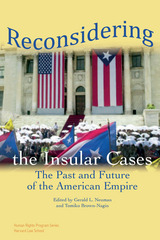

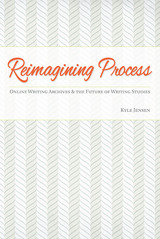
For more than four decades, the dominant model for pedagogy and research in the field of composition has been a how-centered process approach to writing instruction, which involves studying the writing that students produce to expose the various stages of their writing process. By looking at notes, outlines, and multiple drafts, often presented by students together in the form of a portfolio, instructors can identify unproductive habits that students may have and provide techniques that help them improve their writing. In this groundbreaking volume, Kyle Jensen critiques traditional how-centered process instruction and presents a sound, practical methodology by which portfolios and online writing archives—digital interfaces that expose the marks of revision writers make during composition—might be employed to develop theories about what writing is: how it occurs, functions, circulates, creates meaning, and forms its subjects. Offering online writing archives as a way to envision a transdisciplinary approach to writing studies, Reimagining Process does not abandon the prevailing concepts of process pedagogy but rather casts them in wider contexts to conceive new ways of teaching and studying writing.
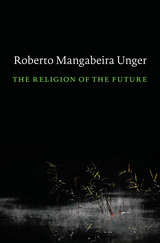
How can we live in such a way that we die only once? How can we organize a society that gives us a better chance to be fully alive? How can we reinvent religion so that it liberates us instead of consoling us?
These questions stand at the center of Roberto Mangabeira Unger’s The Religion of the Future. Both a book about religion and a religious work in its own right, it proposes the content of a religion that can survive faith in a transcendent God and in life after death. According to this religion—the religion of the future—human beings can be more human by becoming more godlike, not just later, in another life or another time, but right now, on Earth and in their own lives.
Unger begins by facing the irreparable flaws in the human condition: our mortality, groundlessness, and insatiability. He goes on to discuss the conflicting approaches to existence that have dominated the last 2,500 years of the history of religion. Turning next to the religious revolution that we now require, he explores the political ideal of this revolution, an idea of deep freedom. And he develops its moral vision, focused on a refusal to squander life.
The Religion of the Future advances Unger’s philosophical program: a philosophy for which history is open, the new can happen, and belittlement need not be our fate.
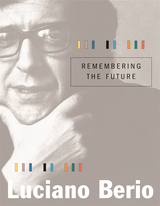
In Remembering the Future Luciano Berio shares with us some musical experiences that “invite us to revise or suspend our relation with the past and to rediscover it as part of a future trajectory.” His scintillating meditation on music and the ways of experiencing it reflects the composer’s profound understanding of the history and contemporary practice of his art.
There is much in this short book that provides insight on Berio’s own compositions. Indeed, he comments that writing it “led me to formulate thoughts that might otherwise have remained concealed in the folds of my work.” He explores themes such as transcription and translation, poetics and analysis, “open work,” and music theater. The reader will also find here numerous insights on the work of other composers, past and present, and much more. A figure of formidable intellect, Berio ranges easily among topics such as Schenkerian analysis, the criticism of Carl Dahlhaus and Theodor Adorno, the works of his friends and sometime collaborators Italo Calvino and Umberto Eco. But Berio carries his learning lightly—his tone is conversational, often playful, punctuated by arresting aphorisms: “The best possible commentary on a symphony is another symphony.”
Remembering the Future is the text of Berio’s Charles Eliot Norton Lectures of 1993–94, now made available for the first time.
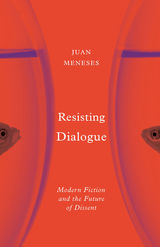
A bold new critique of dialogue as a method of eliminating dissent
Is dialogue always the productive political and communicative tool it is widely conceived to be? Resisting Dialogue reassesses our assumptions about dialogue and, in so doing, about what a politically healthy society should look like. Juan Meneses argues that, far from an unalloyed good, dialogue often serves as a subtle tool of domination, perpetuating the underlying inequalities it is intended to address.
Meneses investigates how “illusory dialogue” (a particular dialogic encounter designed to secure consensus) is employed as an instrument that forestalls—instead of fostering—articulations of dissent that lead to political change. He does so through close readings of novels from the English-speaking world written in the past hundred years—from E. M. Forster’s A Passage to India and Jeanette Winterson’s The Passion to Indra Sinha’s Animal’s People and more. Resisting Dialogue demonstrates how these novels are rhetorical exercises with real political clout capable of restoring the radical potential of dialogue in today’s globalized world. Expanding the boundaries of postpolitical theory, Meneses reveals how these works offer ways to practice disagreement against this regulatory use of dialogue and expose the pitfalls of certain other dialogic interventions in relation to some of the most prominent questions of modern history: cosmopolitanism at the end of empire, the dangers of rewriting the historical record, the affective dimension of neoliberalism, the racial and nationalist underpinnings of the “war on terror,” and the visibility of environmental violence in the Anthropocene.
Ultimately, Resisting Dialogue is a complex, provocative critique that, melding political and literary theory, reveals how fiction can help confront the deployment of dialogue to preempt the emergence of dissent and, thus, revitalize the practice of emancipatory politics.
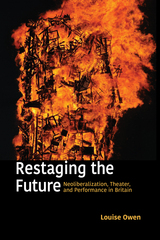
Post-Thatcher, British cultural politics were shaped by the government’s use of the arts in service of its own social and economic agenda. Restaging the Future: Neoliberalization, Theater, and Performance in Britain interrogates how arts practices and cultural institutions were enmeshed with the particular processes of neoliberalization mobilized at the end of the twentieth century and into the twenty-first.
Louise Owen traces the uneasy entanglement of performance with neoliberalism's marketization of social life. Focusing on this political moment, Owen guides readers through a wide range of performance works crossing multiple forms, genres, and spaces—from European dance tours, to Brazilian favelas, to the streets of Liverpool—attending to their distinct implications for the reenvisioned future in whose wake we now live.
Analyzing this array of participatory dance, film, music, public art, and theater projects, Owen uncovers unexpected affinities between community-based, experimental, and avant-garde movements. Restaging the Future provides key historical context for these performances, their negotiations of their political moment, and their themes of insecurity, identity, and inequality, created in a period of profound ideological and socioeconomic change.
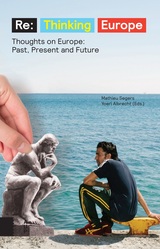


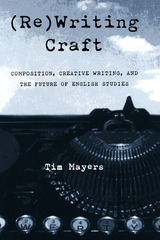
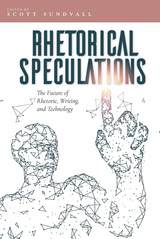
Rhetoric and writing studies often engages technological shifts reactively, after the production and reception of rhetoric and writing has changed. This collection allows rhetoric and writing scholars to explore modes of critical speculation into the transformative effect of emerging technologies, particularly as a means to speculate on future shifts in the intellectual, pedagogical, and institutional frameworks of the field. In doing so, the project repositions rhetoric and writing scholars as proprietors of our technological future to come rather than as secondary receivers, critics, and adjusters of the technological present.
Major and emerging voices in the field offer a range of styles that include pragmatic, technical, and philosophical approaches to the issue of speculative rhetoric, exploring what new media/writing studies could be—theoretically, pedagogically, and institutionally—as future technologies begin to impinge on the work of writing. Rhetorical Speculations is at the cutting edge of the subject of futures thinking and will have broad appeal to scholars of rhetoric, literacy, futures studies, and material and popular culture.
Contributors:
Bahareh Brittany Alaei, Sarah J. Arroyo, Kristine L. Blair, Geoffrey V. Carter, Sid Dobrin, Kristie S. Fleckenstein, Steve Holmes, Kyle Jensen, Halcyon Lawrence, Alexander Monea, Sean Morey, Alex Reid, Jeff Rice, Gregory L. Ulmer, Anna Worm
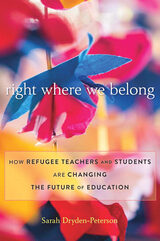
A leading expert shows how, by learning from refugee teachers and students, we can create for displaced children—and indeed all children—better schooling and brighter futures.
Half of the world’s 26 million refugees are children. Their formal education is disrupted, and their lives are too often dominated by exclusion and uncertainty about what the future holds. Even kids who have the opportunity to attend school face enormous challenges, as they struggle to integrate into unfamiliar societies and educational environments.
In Right Where We Belong, Sarah Dryden-Peterson discovers that, where governments and international agencies have been stymied, refugee teachers and students themselves are leading. From open-air classrooms in Uganda to the hallways of high schools in Maine, new visions for refugee education are emerging. Dryden-Peterson introduces us to people like Jacques—a teacher who created a school for his fellow Congolese refugees in defiance of local laws—and Hassan, a Somali refugee navigating the social world of the American teenager. Drawing on more than 600 interviews in twenty-three countries, Dryden-Peterson shows how teachers and students are experimenting with flexible forms of learning. Rather than adopt the unrealistic notion that all will soon return to “normal,” these schools embrace unfamiliarity, develop students’ adaptiveness, and demonstrate how children, teachers, and community members can build supportive relationships across lines of difference.
It turns out that policymakers, activists, and educators have a lot to learn from displaced children and teachers. Their stories point the way to better futures for refugee students and inspire us to reimagine education broadly, so that children everywhere are better prepared to thrive in a diverse and unpredictable world.
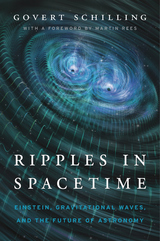
It has already been called the scientific breakthrough of the century: the detection of gravitational waves. Einstein predicted these tiny ripples in the fabric of spacetime nearly a hundred years ago, but they were never perceived directly until now. Decades in the making, this momentous discovery has given scientists a new understanding of the cataclysmic events that shape the universe and a new confirmation of Einstein’s theory of general relativity. Ripples in Spacetime is an engaging account of the international effort to complete Einstein’s project, capture his elusive ripples, and launch an era of gravitational-wave astronomy that promises to explain, more vividly than ever before, our universe’s structure and origin.
The quest for gravitational waves involved years of risky research and many personal and professional struggles that threatened to derail one of the world’s largest scientific endeavors. Govert Schilling takes readers to sites where these stories unfolded—including Japan’s KAGRA detector, Chile’s Atacama Cosmology Telescope, the South Pole’s BICEP detectors, and the United States’ LIGO labs. He explains the seeming impossibility of developing technologies sensitive enough to detect waves from two colliding black holes in the very distant universe, and describes the astounding precision of the LIGO detectors. Along the way Schilling clarifies concepts such as general relativity, neutron stars, and the big bang using language that readers with little scientific background can grasp.
Ripples in Spacetime provides a window into the next frontiers of astronomy, weaving far-reaching predictions and discoveries into a gripping story of human ambition and perseverance.

A Physics Today Best Book of the Year
A Forbes “For the Physics and Astronomy Lover in Your Life” Selection
“Succinct, accessible, and remarkably timely… This book is a rare find.”
—Physics Today
“Belongs on the shelf of anyone interested in learning the scientific, historical, and personal stories behind some of the most incredible scientific advances of the 21st century.”
—Forbes
The detection of gravitational waves has already been called the scientific breakthrough of the century. Einstein predicted these tiny ripples in the fabric of spacetime over a hundred years ago, but they were only recently perceived directly for the first time. Ripples in Spacetime is an engaging account of the international effort to complete Einstein’s project, capture his elusive ripples, and launch an era of gravitational-wave astronomy that promises to explain, more vividly than ever before, our universe’s structure and origin.
“Schilling’s deliciously nerdy grand tour takes us through compelling backstory, current research, and future expectations.”
—Nature
“A lively and readable account… Schilling underlines that this discovery is the opening of a new window on the universe, the beginning of a new branch of science.”
—Graham Farmelo, The Guardian
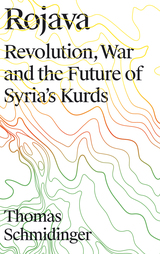
READERS
Browse our collection.
PUBLISHERS
See BiblioVault's publisher services.
STUDENT SERVICES
Files for college accessibility offices.
UChicago Accessibility Resources
home | accessibility | search | about | contact us
BiblioVault ® 2001 - 2024
The University of Chicago Press









